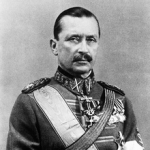
Morale Building quotes from Carl Gustaf Mannerheim:
 “Fortifications, artillery, and foreign aid will be of no value unless the ordinary soldier knows that he is defending his country.”
“Fortifications, artillery, and foreign aid will be of no value unless the ordinary soldier knows that he is defending his country.”
“In war the psychological factors are often the decisive ones. An adversary who feels inferior is in reality so.”
Carl Gustaf Mannerheim, in full Carl Gustaf Emil Mannerheim (born June 4, 1867, Villnäs, Fin.—died Jan. 27, 1951, Lausanne, Switz.), Finnish military leader and conservative statesman who successfully defended Finland against greatly superior Soviet forces during World War II and served as the country’s president (1944–46).
MORE…
Mannerheim was of Swedish ancestry. He entered the Russian army in 1889 as a lieutenant in the cavalry. Finland was then a part of the Russian Empire, and Mannerheim distinguished himself during the Russo-Japanese War (1904–05) and World War I, rising to the rank of lieutenant general and corps commander in the Russian army. After the outbreak of the October (November) Russian Revolution in 1917 he returned to Finland, which had declared its independence from Russia. A conservative aristocrat and monarchist, Mannerheim assumed command of the “White” (anti-Bolshevik) forces in January 1918 during the Finnish Civil War and, with German assistance, defeated the Finnish Bolsheviks and expelled Russian forces in a bloody four-month campaign. He became regent of Finland in December 1918, holding this post for seven months until a republic was declared in 1919. From 1919 to 1931 he lived in semiretirement, concerning himself with volunteer health and social welfare causes in Finland.
MORE…
Reentering public life in 1931, Mannerheim became chairman of the national defense council. During his eight-year tenure, Finland constructed the so-called Mannerheim Line of fortifications across the Karelian Isthmus facing Leningrad; this system of defenses was intended to block any potential aggressive moves by the Soviet Union. When Soviet forces attacked Finland in December 1939, he served as commander in chief, and his brilliant leadership won considerable successes against vast numerical superiority, but the end result was defeat, resulting in a relatively harsh peace settlement in 1940.
Hoping to win back some territory regarded by some as historically Finnish, Finland successfully joined Nazi Germany in its invasion of the Soviet Union in June 1941. Mannerheim was named the only marshal of Finland in June 1942. But as Russian strength grew and Germany weakened, Mannerheim’s troops were forced to retreat. He was named president of the Finnish republic in August 1944 in the hope that he would be able to negotiate a separate peace with the Soviets, which he did, signing an armistice with them in September. The armistice ultimately led to a peace treaty by which Finland was forced to make concessions more extensive than those made after the winter war. Mannerheim remained president until ill health forced his retirement in 1946. He wrote Erinnerungen (1952; Memoirs).
Source: www.britannica.com

